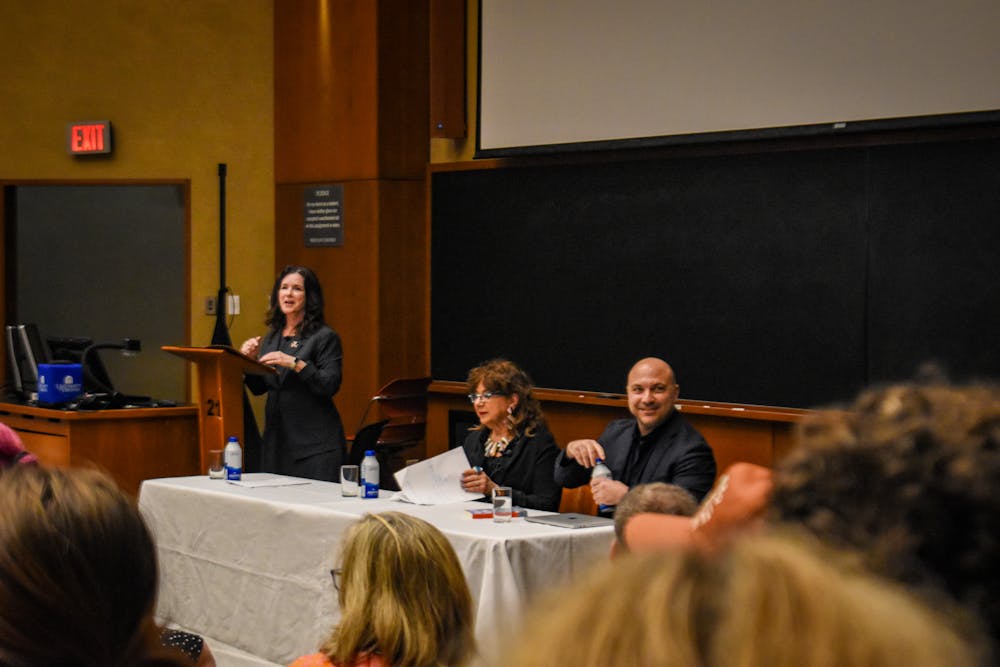The University’s Task Force on Religious Diversity and Belonging — chaired by Christa Acampora, dean of the College and Graduate School of Arts & Sciences and professor of philosophy — led a discussion on fostering respectful and productive dialogues surrounding the Israel-Hamas war Tuesday. The event, titled “Enabling Difficult Conversations,” featured Dartmouth professors Tarek El-Ariss and Susannah Heschel, who chair the Middle Eastern Studies and Jewish Studies departments at Dartmouth, respectively.
Acampora opened Tuesday’s event by presenting a statistic regarding religious respect on Grounds. According to the latest Student Experience in the Research University (SERU) Survey — an annual survey the University releases to students to evaluate broad student experience — Jewish and Muslim students reported feeling less respected in their religious beliefs on campus compared to other student groups. Acampora said these findings indicate a need for University community members to be more open to other religious perspectives.
“These are the lowest levels of any other group responding to the survey,” Acampora said. “There is real work to be done.”
In their discussion, the two guest professors cited examining shared histories and learning about different religious perspectives as two important steps in fostering productive dialogue surrounding the Israel-Hamas war. Acampora posed questions to El-Ariss and Heschel, and then accepted anonymous questions from the audience — comprising students, faculty and Charlottesville community members. Students, faculty members, and Charlottesville community members attended the event in the lecture hall, reaching nearly full occupancy.
The University introduced the Task Force on Religious Diversity and Belonging in December to address issues related to promoting religious inclusivity and productive conversations within the University community. According to its website, the task force aims to ensure that the University is welcoming to community members from all religions and cultures. The task force employs methods such as focus groups and an online discussion forum for conversation regarding religious experience, as well as organizes conversational events for discussing the Middle-East conflict.
El-Ariss and Heschel’s campus dialogue efforts at Dartmouth have been ongoing since Oct 7. Subsequently, they organized campus forums at Dartmouth that aimed to promote respectful and understanding dialogue surrounding the conflict. Additionally, in the Spring 2024 semester, they co-taught a course that broke down the complex histories of Jewish and Muslim groups in the modern world, titled “The Arab, The Jew and the Construction of Modernity.”
El-Ariss said that he has focused on the historical intersections of struggles between Jewish and Muslim groups in his research. According to El-Ariss, divided students can reflect on overlapping historical challenges faced by both groups, rather than solely framing Jewish-Muslim relations within the context of current conflicts.
“[There is a] perspective that somehow Jews and Arabs are incompatible or [can] only be viewed through the lens of conflict,” El-Ariss said. “When you start looking at [European Enlightenment] history, you find solidarity … this is what we tried to convey to the students … and say, these are models of coexistence.”
El-Ariss added that in bridging conversations between divided student groups, they intend to build a model for conversation that is grounded in understanding opposing perspectives. Similarly, Heschel noted that understanding different religious perspectives is a step towards a collaborative conversation.
“We are trying to recapture, reconstitute and continue what has been going on for a long time,” Heschel said. “[We should] recognize how important it is for us as human beings to not just understand our own religion, but to understand it more deeply by engaging and studying other religions.” Heschel said.
After speaking on their research perspectives and goals for divisive conversations, Acampora opened the floor for anonymous questions from audience members. One question asked the speakers if the student-led protests at universities — which have been growing in number — are productive.
Currently, student-led protests across colleges and universities are rising — Tuesday afternoon, University students set up a “liberation zone” to protest the war in Gaza. The University’s Students for Justice in Palestine previously led a “die-in” protest Apr. 19. As student activism surrounding the war in Gaza spreads across college and university campuses nationwide, El-Ariss and Heschel said they are committed to encouraging thoughtful dialogue regarding the Israel-Hamas war at Dartmouth as well.
Heschel and El-Ariss said that protests are not harmful, so long as they are peaceful. Heschel said that student-led protests should be balanced with scholarship and empathy as well, and repeated the sentiment that working to learn more about opposing perspectives is necessary.
“We're not opposed to the protests, [and] we're not opposed to people expressing political views … we do hope that with the expression of protest, there will also be an engagement with academic scholarship,” Heschel said.







